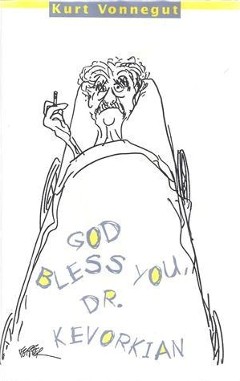 First edition | |
| Author | Kurt Vonnegut |
|---|---|
| Language | English |
| Genre | Speculative fiction |
| Publisher | Seven Stories Press |
Publication date | 1999 |
| Publication place | United States |
| Media type | |
God Bless You, Dr. Kevorkian, by Kurt Vonnegut, is a collection of short fictional interviews written by Vonnegut and first broadcast on WNYC. The title parodies that of Vonnegut's 1965 novel God Bless You, Mr. Rosewater . It was published in book form in 1999.